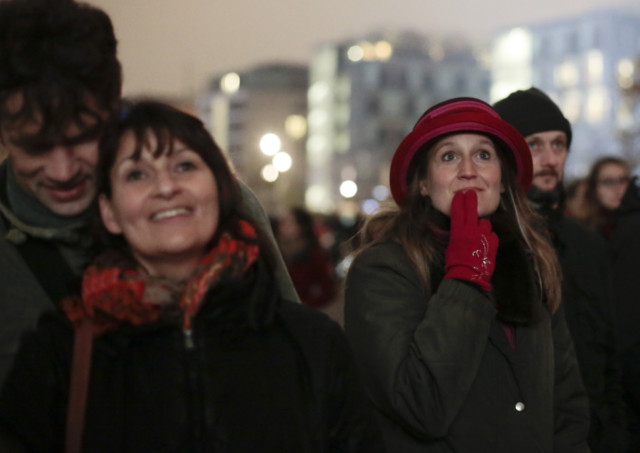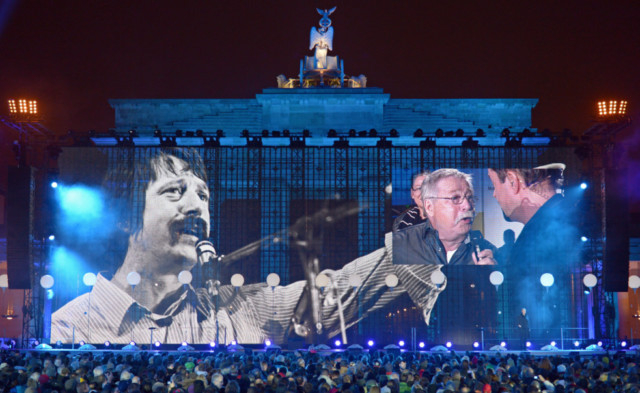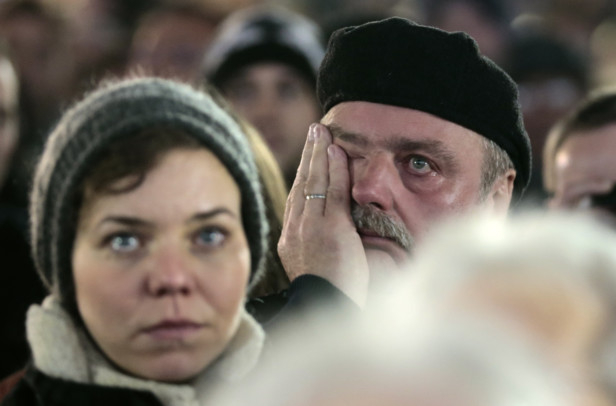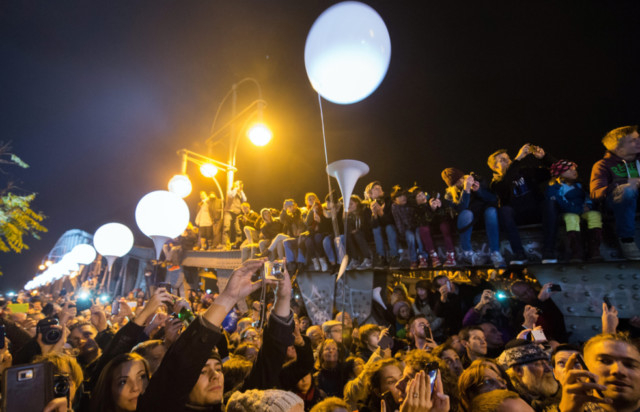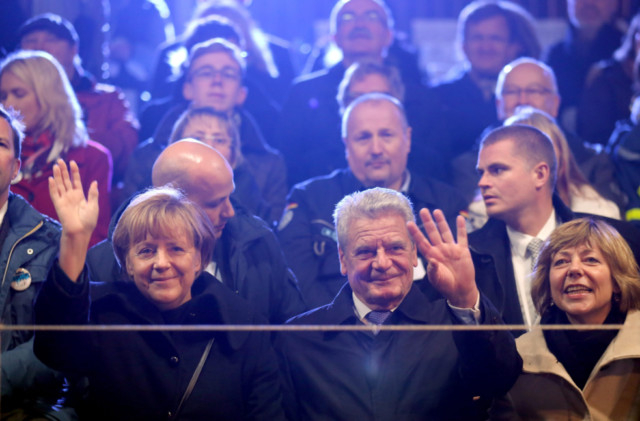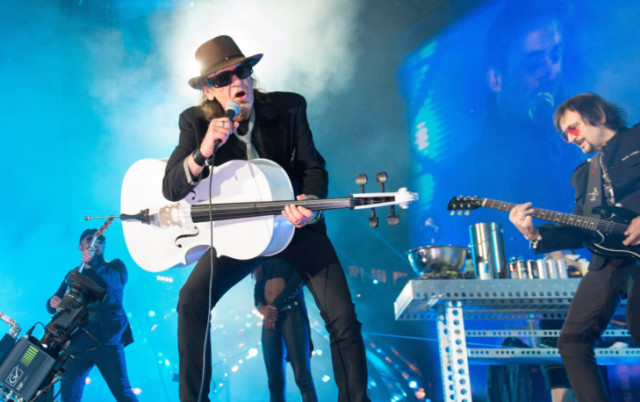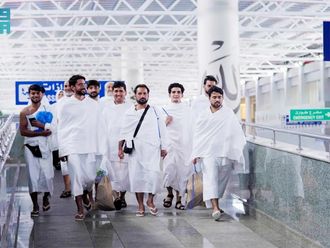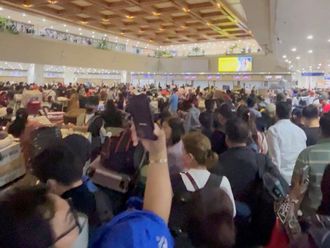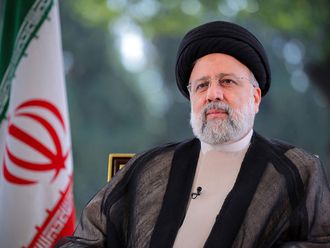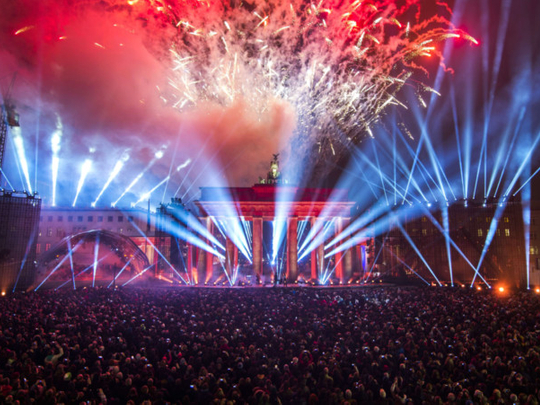
Berlin: A day that began in mournful contemplation ended in a raucous street party for hundreds of thousands as Germany marked the 25th anniversary of the collapse of the Berlin Wall.
The split nature of the commemorations — downbeat trumpets in the morning, gyrating pop stars at night — reflected the silver anniversary’s strange duality: A quarter of a century after it came down, the wall still evokes some of modern Europe’s darkest hours and hardest-fought triumphs, and in this nation of 80 million its demise is at once an occasion for sober reflection about its many victims and cause for rejoicing over the Cold War’s abrupt end.
Under chilly grey skies, dissidents and dignitaries gathered Sunday morning in a residential section of central Berlin next to an extant portion of the wall that has been refurbished as a memorial. With a former East German watchtower looming behind her, German Chancellor Angela Merkel received a flower from one of dozens of goodwill child volunteers and joined them and others in placing the blossoms in spaces in the wall.
Shortly after, Merkel told officials and journalists that the message of the wall continued to resonate.
“This concrete symbol of state tyranny brought millions to where they could not tolerate it anymore,” Merkel said. “But we have the power to create. We can change things for the good.”
Sunday evening, entertainers of all stripes took the stage outside the Brandenburg Gate, the ornate landmark that separated East and West Berlin and where numerous leaders, including Ronald Reagan, gave famous Cold War speeches.
The evening contained some political content — after nodding to Mikhail Gorbachev on a dais, Berlin Mayor Klaus Wowereit drew cheers of “Gorby” from the crowd — but for the most part music and revelry reigned.
Conductor Daniel Barenboim led the Berlin State Opera orchestra in a spirited performance of Beethoven’s Ninth Symphony, a callback to a Barenboim-led performance of Beethoven’s Seventh in 1989.
Peter Gabriel performed his 2010 cover rendition of ‘Heroes’, the song David Bowie famously sang, in German, during a Cold War concert in West Berlin.
Various German pop stars, youth choirs and performance dancers took the stage in acts that reflected the era of the wall. An elaborate fireworks display was launched and Wowereit presided over the unleashing of lighted balloons into the sky; the orbs had been affixed to temporary stands and traced the path of the Berlin Wall for nine miles around the city.
Meanwhile, the East Berlin-raised techno musician Paul Kalkbrenner did after-hours duty, assembling electronica tracks for the throngs while the Brandenburg Gate behind him was turned into a canvas for a strobing light show.
Perhaps the night’s strangest turn came when the Cold War-era pop star Udo Lindenberg took the stage. The freewheeling singer had a key role during the era of the wall — he had played a show in East Berlin, rallying the city’s youth. ‘Beyond the Horizon’, a current hit musical about love divided by the Berlin Wall, is inspired by his life and career.
Berliners might have needed a release after the daytime events.
At the flower-placing memorial on the city’s once-divided Bernauer Street, now in the fashionable Mitte district, dissidents described the “tears of blood” that ran through the city because of the Cold War-era divide, as Merkel and Wowereit stood just feet from the “death strip,” the shoot-to-kill buffer zone where an estimated 138 people were slain trying to escape East Germany.
As a neighbourhood in the centre of Berlin, Mitte was both one of the most prominent areas to be sealed off when the wall went up unexpectedly in August 1961 — and, with its condos and restaurants that have sprang up since, ground zero for the revitalisation that has occurred in the time since the wall fell.
The Berlin Wall memorial in particular has become a place for the city to process its darker memories.


